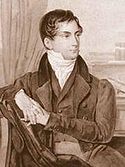
Dmitry Venevitinov
Encyclopedia

Of noble parentage, Venevitinov entered the Moscow University in 1824. He became a member of the circle of "wisdom-lovers" (Lyubomudry
Lyubomudry
Lyubomudry were the members of the secret circle "Society of Lyubomudriye" which existed in Russia in 1823-1825. Lyubomudriye was the Slavophile replacement term for "philosophy", i.e., the formal translations would be "Philosophers" and "The Society of Philosophy", respectively. The circle was...
), led by Prince Vladimir Odoevsky
Vladimir Odoevsky
Prince Vladimir Fyodorovich Odoevsky was a prominent Russian philosopher, writer, music critic, philanthropist and pedagogue. He became known as the "Russian Hoffmann" on account of his keen interest in fantasmagoric tales and musical criticism.-Life:...
. Venevitinov and his friends were the young Idealists who introduced into Russia the cult of Goethe and Schelling
Schelling
Notable people with the last name of Schelling include:* Ernest Schelling, American composer* Friedrich Wilhelm Joseph Schelling, German philosopher* Thomas Schelling, American economist and Nobel laureate...
's metaphysics.
Venevitinov's poems (of which there are forty) dwell on philosophical subjects. According to D.S. Mirsky, "his diction is very pure, and his rhythms pure and majestic". In one of his better known poems, Venevitinov vainly pleaded Pushkin to address an ode to Goethe.
Venevitinov's early death was lamented by a number of Russian poets and critics. His line "Kak znal on zhizn'! kak malo zhil!" (How well he knew life! how little he did live!) was carved on his tomb at the Simonov Monastery
Simonov Monastery
Simonov monastery in Moscow was established in 1370 by monk Feodor, a nephew and disciple of St Sergius of Radonezh.The monastery land formerly belonged to Simeon Khovrin, a boyar of Greek extraction and progenitor of the great clan of Golovins. He took monastic vows in the cloister under the name...
. The Soviets had his remains moved to the Novodevichy Cemetery
Novodevichy Cemetery
Novodevichy Cemetery is the most famous cemetery in Moscow, Russia. It is next to the 16th-century Novodevichy Convent, which is the city's third most popular tourist site. It should not be confused with the Novodevichy Cemetery in Saint Petersburg....
.

